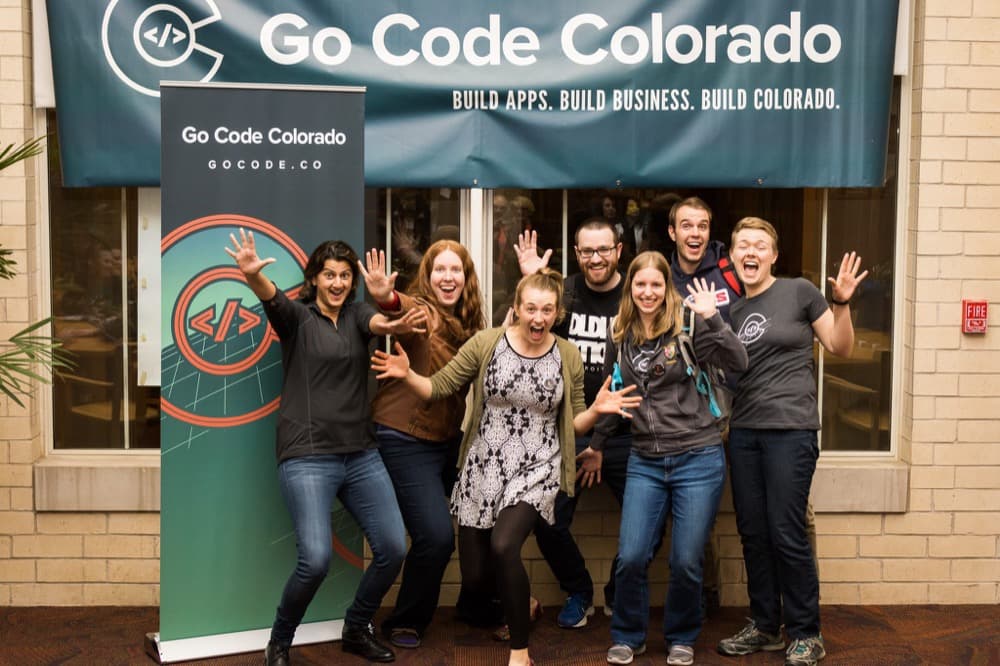
Creating a more diverse work environment can start with a change in perspective. A group of Denver developers have come up with an app that helps provide that different point of view, and they're finalists in this year's Go Code Colorado competition.
The <div>ersity team is seven women and three men whose backgrounds are a little unusual for the tech world. The final competition, in which <div>ersity will compete against nine other teams from around the state, is Wednesday.
About the team:
While most of the team members are white, they're diverse in other ways that stand out on the tech scene. Each team member is the first person in their family to graduate from college. Members of the <div>ersity team also came from rural areas and low-income families. And the team is mostly women in a male-dominated field. The team met through their common interest in creating more diverse work spaces in tech companies. One of the team members, Kate Catlin, played a role in the creation of the team and currently runs a company called “Flock.” The company focuses on helping women in the tech industry achieve their individual career goals.
“I was the common thread because of the company I run,” said Catlin. “I didn’t see any groups focusing on what happens to women once they get into tech.”
Catlin pointed to the fact that 56 percent of women leave the technology industry after they get into it. She said it is largely due to a feeling of hostility and lack of opportunities in their careers.
Another member of the <div>ersity team is Kim Schlesinger. Schlesinger is currently a teacher and web developer at Galvanize. She had previously taught special education at an elementary school in Fort Collins. Her students ranged from kindergarteners to fifth graders.
“I think the app can help start a discussion about why there is a lack of diverse employees at Colorado tech companies,” said Schlesinger.
How it works:
The app is available through Google Play and Apple’s App Store. Upon opening the app, <div>ersity begins with a questionnaire about company’s hiring needs. The questionnaire asks users if they have ever heard of the “ketchup problem.” If employers answer no to the question, then the app gives a link to a Los Angeles Times article addressing the ketchup problem.
The ketchup problem revolves around the idea of you opening up your refrigerator (or cupboard depending on where you grew up) to use ketchup, but finding that the bottle is empty. You will then need to find another sauce and use whichever condiment is nearby. If you opened the refrigerator to find your ketchup bottle empty, you will be more likely to use mayo because it is in the refrigerator. However, if the ketchup is in the cupboard you will have more options for different types of sauces such as Tabasco or malt vinegar. The ketchup problem exemplifies how a change in perspective can lead an employer to an array of diverse employees and solutions.
“The whole point is trying to bring perspective to a team,” said Catlin. “The more perspective you have, it helps.”
“Hopefully we get people thinking about places in Colorado to hire more diversely,” said Schlesinger.
Along with being informed about the ketchup problem, <div>ersity app users will also be asked about their knowledge about the benefits of gender diversity. According to the app, companies in the top quartile of gender diversity are 15% more likely to outperform their peers financially.
“We know the research is out there,” said <div>ersity team member Laura Baumgartner. “It’s profitable for teams to be diverse.”
The app will then begin to ask users information about what type of candidate they are searching for. Questions revolve around the title of the job you’re looking to fill, if you’re open to hiring a remote worker, what level of experience you are looking for and if you are searching for a generalist or a specialist.
Users of the app will also be asked general questions about their company. Those questions revolve around where the job is located, how many employees the company has and if you are open to on-the-job training.
Following the questionnaire users will be given a “Diversity Score.” The Diversity Score is calculated by analyzing the percentage of students for every school or degree program who have specific diverse traits. This can range from gender to ethnic backgrounds and socio-economic status.
The Diverse Score page of the app also provides employers with a list of colleges and universities in Colorado that are known for diversity. This list includes schools such as Metro State University of Denver, Colorado State University-Pueblo and Community College of Denver.
“I think our app can raise awareness about what Colorado state schools have a lot of diverse students,” said Schlesinger. “(The app) can get hiring managers and human resource people to think, 'Maybe we should look at these other schools.'"
The app has received more than 50 responses from people in the business world, team members said.
“Their responses indicate to our team that there is a need for this type of resource in the market,” said Baumgartner. Companies of many sizes are interested in using <div>ersity as a consistent resource.”
How the Go Code Colorado competition works:
Go Code Colorado is hosted by the Colorado Secretary of State, and it is mainly funded through business filing fees. The competition aims to increase awareness about the value of public data. This is the fourth year the competition has been held, and each year Go Code Colorado gives competitors a new challenge. This year’s challenge was simple: “Build an app that uses public data to solve a problem for a business decision-maker.” The competition began on Feb. 1. Two teams each were selected from Fort Collins, Denver, Colorado Springs, Durango and Grand Junction. Finalists are selected based on their pitch of their idea.
Contestants are judged by five business leaders. This year’s judges are Sandi Mays, founder, CIO and EVP at Zayo; Nicole Craine, COO of SurveyGizmo; Ingrid Alongi, founder and head talent at Cognizant; Joe Thurman, founder and CEO at JobberTechTalk.com and Jobber Group; and Erik Mitisek, executive director of Project X-ITE at the University of Denver and chief innovation office at the State of Colorado.
Teams in the event are evaluated based on five factors, one of which is based on innovation and impact. Judges evaluate whether the concept of the app is new and different. It also evaluates whether the app solves a “real problem” for business decision-makers. Judges will also evaluate if teams have the right skills to build the app, how well-built the app is, how the team uses data sources and the presentation of the app.
The winner of the competition will receive a $25,000 contract with the state and a trip to Silicon Valley for a day of coaching with the AT&T Foundry in Palo Alto.
The contract is unique in the sense that the state purchases the intellectual property of the application for a year. However, the contract allows the winning team to continue to use and develop their idea. After the year, the state re-assigns the IP back to them.













